#African Grey Parrot aviary
Text
#african grey lifespan#african grey#tiktokparrot#africangrey#african grey parrot care#african grey behavior#african grey parrot lifespan in captivity#buying an african grey parrot#african grey parrot#cute birds#african grey adoption#african grey breeders#african grey care#African Grey chicks#African Grey conservation#African Grey cost#african grey food#African Grey for beginners#African Grey for families#African Grey for single owners#African grey Habitat#african grey Intelligence#African grey lifespan#african grey Mimicry#African Grey Parrot#african grey parrot adoption#african grey parrot as pets#African Grey Parrot aviary#african grey parrot behavior#african grey parrot breeding
0 notes
Note
Hi Courtney! for the weird writer asks please:
4. What’s a word that makes you go absolutely feral?
36. They say to Write What You Know. Setting aside for a moment the fact that this is terrible advice...what do you Know?
Hi Rae! Thanks for the ask. These are fun!
4. What’s a word that makes you go absolutely feral?
Ooof. Irregardless. Like, setting aside the “sounds fake but okay” of it all… While it is technically an actual word, this clumsy, ridiculous double-negative mess means the exact same thing without the discordant “ir-”. Which is nonsensical! Just say “regardless”! But wait, what’s that? Most people who use this word actually think it means the opposite?
I just, I can’t.
36. They say to Write What You Know. Setting aside for a moment the fact that this is terrible advice...what do you Know?
I don’t actually think it’s always terrible advice! You certainly shouldn’t be constricted to writing what you know, or let it limit the stories you tell. But I think there’s a lot to be said for bringing some aspect of your own knowledge or history or experience into what you write, as long as it’s used as a tool to strengthen characters and serve the story.
But to actually answer the question… I know birds. African and South American parrots, specifically. Is that weird? My dad was a breeder for my whole childhood, and I basically grew up in an aviary. He specialized in Congo and Timneh Greys (and for a long time was the go-to Grey breeder in the country), but Meyers, Senegals, Caiques, Capes, Indian and African Ringnecks, Amazons, whatever. You name it, we raised it. We belonged to a regional bird club that had meetings and shows. I learned how to handfeed baby birds at 11. We all had our own pets — my mom had Poncho, who was exactly like every African Grey you’ve ever seen a special on, my sister had a peachface lovebird, Romeo, and I had my childhood cockatiel, Tango (who was a Lutino, a big sweetheart, and a pretty good talker but loved to sing). It’s been years, but I can still tell you what dominant and recessive genes you need to pair to get a whiteface pearl pied cockatiel or an albino ringneck.
I have no idea when any of that would ever be helpful in terms of writing, but there it is.
9 notes
·
View notes
Note
(Video does not contain gore or upsetting image, it's a bird doing tricks)
https://youtube.com/shorts/g-KmjExgPRA?si=qxYNVZFziV5hHldr
I know it's not an owl, but is that bird ethical to keep? (If you know). Thanks either way!
African grey parrots are high on the list of most difficult parrots to ethically keep because they are incredibly intelligent in a way that requires a lot of mental stimulation. You can’t really justifiably leave them alone in a cage for long parts of the day for the same reason you can’t leave a toddler in their room alone all day.
The enrichment activities in the video are good exercises, but to keep the bird properly enriched you need to either take it everywhere you go or just stay at home all day entertaining it.
They can work fine in an aviary at a zoo where they can fit more enrichment and the birds can people watch and have other birds to interact with (though the greys I’ve known have preferred to keep to themselves or with one person honestly) to pass time, but in most households it is going to be impossible for the bird to be properly occupied.
28 notes
·
View notes
Text
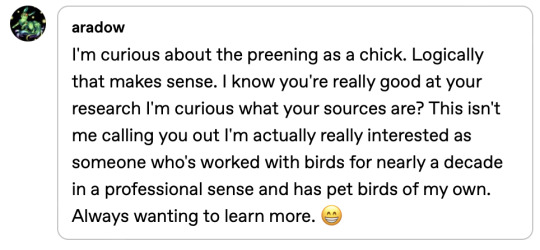
For sure! @aradow
Garuda aviary mentions the concept here (where I was first introduced to the concept, they are mostly theorizing based on what we know of chick development and observed feather destruction between wild and captive birds.)
this article covers how the parent bird plays a crucial role in how the chicks are able to respond to stressors (study on chickens not parrots)
The Manual of parrot behaviour has a chapter on the influences of hand rearing on feather picking behaviours, the whole book is a pretty informative read
comparison of wild caught, parent reared, and hand reared African grey behaviour
comparing feather picking with corticosterone excretion (and mentions how endorphins help to cope with increased corticosterone)
General overview of plucking influences and social, developmental factors
Concludes that feather plucking behaviours are commonly sourced back to the imprinting periods prior to fledging among other influential factors
and if anyone wants to do further digging the "sciency" term for feather plucking is "pterotillomania" which helps a lot in finding good sources
44 notes
·
View notes
Text
All About African Grey Parrot for Sale

African Grey Parrots are some of the most fascinating and intelligent birds in the world. Their unique abilities to mimic human speech and understand complex concepts have made them a popular companion pet for many bird enthusiasts. These parrots have a distinctive appearance, with their grey feathers and striking red tails. They are native to the rain forests of West and Central Africa, where they live in large flocks and roost in trees. African Grey Parrots require a lot of attention and mental stimulation, as they are highly social and curious birds. If you are considering getting an African Grey Parrot as a pet, it is important to do your research and ensure that you are prepared to provide them proper care and attention.
African Grey Parrot lifespan
African Grey Parrots are highly sought after as pets for their incredible intelligence and their ability to mimic human speech. These birds are fascinating creatures that require a lot of love, care, and attention. One of the most commonly asked questions about African Grey Parrots is how long they live. The lifespan of an African Grey Parrot can vary depending on a number of factors, including diet, exercise, and medical care. However, on average, African Grey Parrots can live up to 50 years, making them one of the longest-lived birds in captivity. It is important for owners to consider the long-term commitment of caring for an African Grey Parrot and to provide them with the necessary care to ensure they live a long and healthy life.
African Grey Parrot care requirements
As any pet owner can attest, caring for an animal comes with a great deal of responsibility, and owning an African Grey Parrot is no exception. These intelligent and social birds require adequate space, appropriate nutrition, and plenty of mental stimulation and socialization to thrive. Providing an aviary or a cage that is large enough for the bird to spread their wings and move around freely is essential. A variety of fresh fruits and vegetables, along with a nutrient-rich pellet diet, will help keep your parrot healthy. Furthermore, African Grey Parrots are highly intelligent creatures that require mental stimulation and social interaction to live a happy and fulfilling life. Regular playtime, training sessions, and interaction with other birds or humans can promote the bird's health and well-being. Therefore, providing a dedicated and caring home can ensure that African Grey Parrots are not only happy but also healthy, vibrant, and full of life. Before looking to buy african grey parrot for sale must know about the care requirements.
African Grey Parrots require a serious commitment from their owners. If you're ready for the responsibility that comes with owning an African Grey, birdmanspetsources is a reputable breeder that offers African Grey Parrots for sale. But before making your purchase, be sure to research their specific care requirements and prepare your home for their arrival. With proper care and attention, an African Grey Parrot can become a beloved member of your family.
0 notes
Note
greetings todaysbird! i went to a bird sanctuary in Florida in march and took some pictures of the various parrots there. i had meant to drop this in your inbox a while ago but forgot!
this isn’t ALL the photos i took — just some of my favorites!:D i don’t quite remember the sanctuary’s name (i’ll come back if i do) but every bird is very well looked after and healthy!💜 a lot of them are rescues or were brought there by people who couldn’t take care of them, if i remember correctly.
sorry for the lengthy ask but one more thing! what is your favorite type of parrot?🐥💜 mine’s the scarlet macaw!
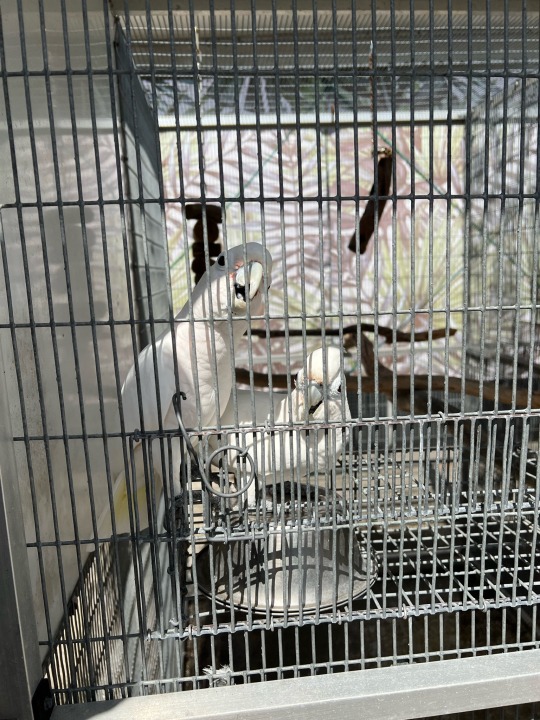



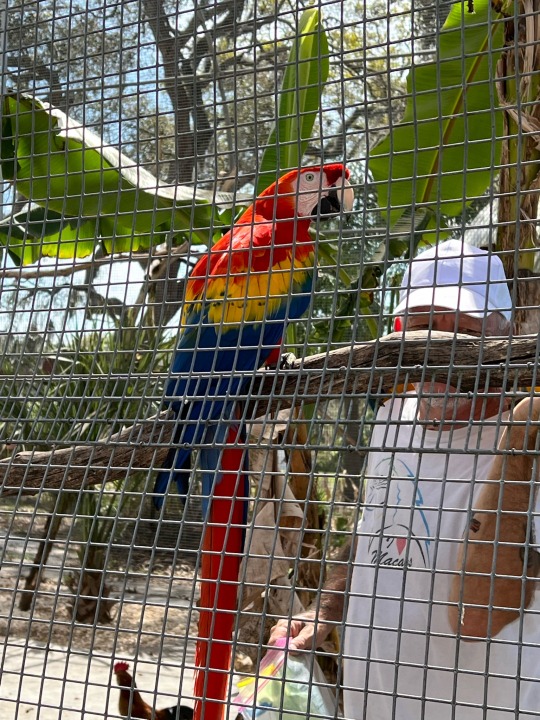


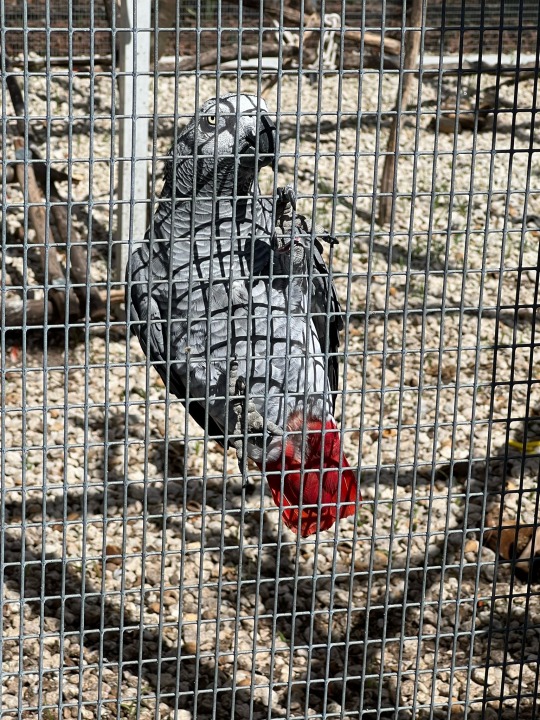
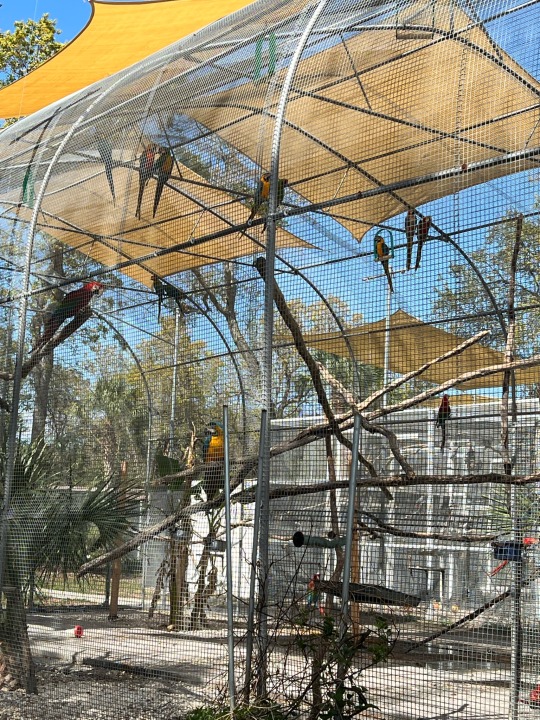

Wow, they all look beautiful, and that’s a wonderful aviary in the last pic!
Im biased towards the pacific parrotlet since I had them growing up :) my favorite endangered species is the Spix’s Macaw, and my favorites that stuck out from my time in rescue are probably the good old budgerigar, cockatiel, blue & gold macaw, african grey…I guess I kinda just liked working with all of them
55 notes
·
View notes
Note

would you like a bird that is Actually Trans?
this is millie the eclectus parrot! they live at the aviary i work at, and is very cool! they used to have regular female plumage, but they bonded with an african grey and started turning green when they were placed in the same cage! we still don’t know exactly what caused it, but they’ve definitely gotten noticeably greener since i began working with them! have a good day <3
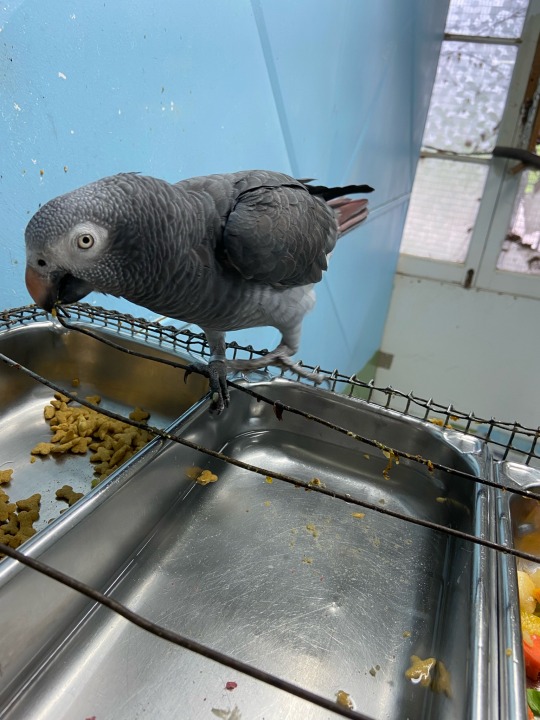
(this is millie’s partner :)
awwww that is so sweet!
thank you for sharing this lovely trans parrot <33
114 notes
·
View notes
Text
So apparently Lincolnshire Wildlife Park had to move five parrots because they kept swearing at people
Per NYT:
When Steve Nichols, the chief executive of the Lincolnshire Wildlife Park, heard employees loudly swearing in the next room, he went over to tell them off.
But there were no employees in the next room. Just the birds.
He then realized that five parrots who moved to the park in the same week shared an unfortunate trait: They all had filthy, filthy mouths.
With more colorful language than plumage, the African grey parrots — Billy, Elsie, Eric, Jade and Tyson — used different curse words in different British accents, but they were all unprintably coarse. At one point, a group of women walking past the aviary thought the lewd comments shouted at them were from a hidden staff member, Mr. Nichols said.
The park had no complaints — in fact, visitors reveled in swearing right back at the birds — but the park officials feared children and parents might not enjoy the experience as much, he said. The chirpy birds were moved into a temporary space away from the public eye, giving them time to be around more family-friendly birds and hopefully clean up their vocabulary.
The birds are expected to be released back into the main colony Wednesday, after their time removed for bad behavior.
A major problem of the parrots’ language, he said, was that it was hilarious.
“When a parrot swears, it’s very difficult for other humans not to laugh,” he said. “And when we laugh, that’s a positive response. And therefore, what they do is they learn both the laugh and the swear word.”
“It’s not so bad with one on its own,” he continued. “But then, if you get five together, once one swears and another one laughs, and another one laughs, before you know it, it sounds like a group of teenagers or an old working men’s club.”
One parrot was especially foul-mouthed, he said: “Billy is the worst one.”

This is Billy, apparently.
Also, from the same article:
Now that the birds have been removed from the public exhibits, some guests are arriving who have heard about the vulgar birds but don’t know which cage they’re in. So they have taken to swearing at all of the birds, hoping they’ll get some abuse back, Mr. Nichols said.
And from the BBC article:
"I'm hoping they learn different words within colonies - but if they teach the others bad language and I end up with 250 swearing birds, I don't know what we'll do," he added.
🤣🤣🤣.
53 notes
·
View notes
Text
youtube
African Grey Parrots: Unlocking Their Genius and Emotional Intelligence!
Discover the incredible world of African Grey Parrots in this in-depth video! These highly intelligent and emotionally sensitive birds are known for their remarkable ability to mimic human speech, but there’s so much more to them.
In this video, we’ll dive into the science behind their intelligence, their emotional needs, and what makes them one of the most fascinating pets to own. Stay tuned as we unlock the secrets behind their genius and learn how to care for these magnificent creatures.
#tiktokparrot#african grey parrot care#african grey parrot lifespan in captivity#african grey lifespan#african grey behavior#buying an african grey parrot#cute birds#african grey#african grey parrot#africangrey#Mitthu#talking parrot#tiktok parrot#parrot talking#smart parrot#african grey Intelligence#african grey parrot Intelligence#grey parrot intelligence#parrot intelligence#african grey parrot brain#african grey parrot talking#african grey parrot sounds#african grey talking#african grey parrot swearing#african grey as a pet#african grey aviary#african grey bird#african grey body language#Youtube
0 notes
Text

(Image from: https://disappearedblog.com/disappeared-episode-list/)
The Loxahatchee Horror – Could It Happen to Your Aviary?
© Howard Voren. Click here to use this content.
If everyone in your household should suddenly disappear, would anyone notice? If they did notice, would they have the initiative or the authority to break into your house to rescue your birds from starvation? In the case of Moses Lall, the well-known bird importer, the answer was no–at least not in time to save the lives of most of the approximately 1,000 birds whose cages lined the open field behind his rented house. On June 15, l994, after the continued urging of several concerned parties, local authorities entered the property. The gruesome sight that they beheld was something that should appear only in ones’ worst nightmare.
What Happened
Moses Lall and his aunt, Lila Buerattan, both natives of Guyana, South America, had lived on a rented 5-acre ranch in Loxahatchee, Florida, since December of 1992. They had moved to the rural community with the idea of starting a large bird-breeding farm. They spoke with no one in the local avicultural community, nor did they interact with anyone at any of the surrounding ranches. They lived extremely private lives, and no one, except their veterinarian, was ever permitted to see their birds. In fact, they even refused to purchase a license that would have allowed them to legally breed and sell birds within the state of Florida. When approached by Florida Fish and Game officers the previous year and urged to purchase a permit and undergo the minimal inspection procedures, they declined. They claimed that the birds were not for sale or breeding, and were being maintained for their personal pleasure. Most of us locals who knew of them never saw them, and were aware of their existence only because we all used the same feed company. In fact, it was the feed company that began sounding the alarm that something was wrong.
On June 9th, the driver for Bird Haven Feed Company arrived to deliver the weekly supply of primate biscuits, sunflower seeds and dried corn to Lall’s farm. No one was there to let him in. Finding no one at the gate to receive the feed was highly unusual. Realizing that they never purchased reserve supplies, and not wanting the birds to go hungry, he piled the feed up in front of the gates. They tried to reach Lall by phone to make sure all was well, but no one answered. Feeling uncomfortable about the situation, they returned the next day. The feed was still piled up outside the gate and had been ruined by the rain. At this point, they called several local aviculturists, as well as Lall’s veterinarian. The questions put to all of them were the same: Do you know where Moses and Lila are? Do you now them well enough to jump the fence, walk through the pack of dogs and go around to the rear of the property to see if someone has been feeding the birds? They all gave the same negative answer.
Between the 11th and the 15th of June, several concerned parties, including the seed company and the veterinarian, began calling the authorities and demanding that action be taken. As birds were starving to death, the concerned parties were sent in a circular motion from one agency to the next. The Palm Beach County Sheriffs’ Department, upon hearing the story, said that animal abuse was the jurisdiction of the Palm Beach County Animal Control. When Animal Control heard the words macaws and parrots, they explained that jurisdiction over exotic birds had been taken way from them and given to Florida Fish and Game. Florida Fish and Game explained that since the facility was not permitted by them, they had no right to enter. They added that if, in fact, birds were starving, a misdemeanor had been committed and that was the jurisdiction of the Sheriffs’ Department.
On June 15th, the feed company contacted Bob and Liz Johnson, who rescue abused, mistreated and crippled birds through a branch of their nonprofit organization, Life Awareness Inc. At that point, Liz contacted me and Dr. Susan Clubb to get a full update on what avenues had been pursued. Upon discovering that pleas for action had been thwarted by “red tape,” she called the Sheriffs’ Office and made demands. After “much insistence,” they reluctantly agreed to send out someone to investigate. The deputy immediately called the Johnsons and reported that our worst fears had been realized. The Johnsons, Dr. Clubb, I and my daughter Stacie raced to the scene to offer assistance in the feeding and care of the birds. By that time, all three of the previously contacted agencies were present.
We were totally unprepared for the sight that we encountered. It was a horror beyond belief: row after row of cages with either dead or dying green-winged and blue-and-gold macaws. Literally every pair of macaws had at least one dead member. Several had succumbed to starvation and dehydration, with their heads in their empty food bowls–a final desperate move with the hope that food would arrive before their last breath was drawn. Although the collection was made up predominately of large macaws, there were also hundreds of smaller parrots and toucans. These included Amazons, hawk heads, African greys, Jardine’s, Pionus and mini macaws. Most of these had succumbed. There were several cages with 25 to 30 birds in them that had either one or no survivors. It was a miracle that any of the birds were alive.
The feed company had told us what the farm’s approximate weekly consumption was. By taking inventory of the feed that was left in the garage, we were able to determine that the birds had not been fed in at least 10 days.
Inside the house awaited another horror. Incubators, still operating, contained dead babies that had hatched but were never fed. Aquarium brooders that were lined up against the wall all had one or two dead baby blue-and-gold macaws. All had starved to death, sitting on clean bedding, while waiting for their next meal. An open bucket of handfeeding formula was on the kitchen counter with a bowl and spoon next to it. It appeared as if someone had changed the bedding in the brooders and was ready to mix up some formula when he or she was interrupted. With our assistance, Dr. Clubb was able to tube-feed those that were too weak to eat or drink. One died in Bob Johnson’s hands while it was waiting to be tube fed. Another 60 birds that were too far gone died the following day. In all, there were only 335 birds left alive from the flock of almost 1,000. The following morning, the birds were taken to the Palm Beach Animal Control facility. Food donations, as well as volunteer labor from all the local bird clubs and organizations, began pouring in. When Lall’s family from Guyana tried to claim the birds as family property, they were presented with a bill for $130,000. The majority of this bill was Animal Control’s standard charge of $10 per animal per day for the care of confiscated animals. Ten dollars per day multiplied by 335 birds adds up very quickly. As the Lalls fought to regain the birds at a more reasonable price, the bill rose to approximately $180,000. On August 22, a judge ordered that the birds be auctioned off individually to the general public in order to raise the most money. Exactly what happened to Moses and Lila is still officially a mystery. Those who knew them said that they truly loved their birds and would never have deserted them. Moses and Lila are now considered dead. The murder investigation cannot proceed any further until their bodies are found. There were also two other people staying at the farm that were originally considered missing. They were Daljeet “Harry” Gobin, a fellow Guyanese, and Felix Eyuom, a reptile dealer from Africa. Harry Gobin is being sought for questioning.
The purpose of this article is not to try to solve an unsolved crime. It is to make everyone aware that such things can and do happen. Although this situation may be unique due to its magnitude, it is not unheard of on a smaller scale. It is not uncommon to read about animals dying from lack of care due to the undiscovered death or incapacitation of those responsible for their care.
What You Can Do
To prevent such a calamity from happening again, each and every one of you should have a plan. This plan should ensure that, should anything happen to you, it will be discovered without delay and your animals will be cared for. This can be as simple as a regularly expected phone call to a friend, a relative or someone’s answering machine. A simple statement like “I’m okay” is all that is necessary. The receiver of the regular call must be ready to notify someone who has been given written authority by you to break into your house and aviaries to care for your birds if you cannot be located. It must also be specifically stated, in a notarized document, who will hold and care for your birds until your whereabouts are discovered, or until your estate is settled. Your birds must never be allowed to be considered legally abandoned.
Lall’s birds were considered abandoned. They suffered the ultimate fate of being sold to the highest bidder without regard to the bidder’s expertise. Two thousand people converged at the auction on September 10th. Most were there to buy a cheap bird for their kids. Most bought bronco wild breeder macaws with the intention of turning them into pets.
Luckily, due to some generous monetary donations, the Johnsons were able to purchase the birds that were blind or crippled. These were purchased to be retired to the parrot sanctuary that they maintain.
All the birds were sold in small temporary holding cages with no doors and with two tiny metal cups. The idea behind no doors was to keep the public from opening the cages at the auction site after the purchase. It was explained to the buyers that the birds should be transferred to suitable housing after they were removed. Unfortunately, two weeks later buyers were still showing up at local vets with their purchases still in the temporary cages with no doors and nothing but the two tiny cups for food and water. As time went on, a large percentage of the birds were diagnosed with papilloma infections.
All proceeds from the publication of this article will go to support the parrot sanctuary run by the Johnsons. Private donations are also appreciated. Their address is Life Awareness Bird Sanctuary, P.O. Box 641032, Miami, FL 33164.
#moseslall#moseslallandlilabuerattan#lilabuerattan#missing#missingadults#missingrelatives#missing person#disappeared#thecharleyproject#charleyproject#lifeawarenessbirdsanctuary#voren#latenightsleuth
8 notes
·
View notes
Text
I love parrots but I can't believe some people get larger parrots from a breeder. Like macaws, African Greys, cockatoos.. their breeding in captivity for commercial sale should be banned.. as it shouldn't be a pet. And should only be rescues.. Their life expectancy is 60 years if not easily more. They will outlive you. And to make it worse, like all larger birds, they pair bond for life. So they often experience extreme distress when their bonded owner dies. And in general too, they will pluck their feathers out of stress of neglect which is easy. How can you provide the stimulation of a forest in a house it's impossible. Like unless you can have an outdoor aviary, it's cruel.
#i dont even understand why people have those as pets#cockatoos are legit insane#macaws and African greys are nice#but still a lot of work#i would have caiques lovebirds ringnecks etc the mid sized ones#i love african greys but dont think id even rescue one
17 notes
·
View notes
Text
BBC News: Friskney's swearing parrots to gain 'discreet' aviary
BBC News - Friskney's swearing parrots to gain 'discreet' aviary
I had an African Grey in West Africa it's stunning how many words they can learn, and how loud they will say them.
3 notes
·
View notes
Text
It makes no sense for “sanctuaries” to keep rare species
We’ve said it before regarding Big Cat Rescue’s “one of only two in the world” white serval, but it also applies to other animals, and animals far less rare than a white serval.
Just now, I was browsing parrot aviaries, to see what other people have built. Your best bet to find large, free-range parrot aviaries are sanctuaries.
My first find (won’t name names unless requested) was what seems to be specializing as a macaw sanctuary, but they also have greys and amazons.
Other than the common blue and golds, greenwings, and scarlets, I find many rare hybrids (including 3rd generation hybrids, and rare miligods), several rare red-fronted macaws, and one hyacinth macaw.
I get it, their owners probably gave their birds to these places specifically, and in that case, my argument fails a bit because you as a (former) owner have the right to give your pet to whatever home you find best fitting.
But in general: Sanctuaries have no business keeping unusual hybrids, red-fronted macaws, let alone hyacinths. Or white servals or golden tabby tigers, to name a few.
Why?
Because you can always find a good home for those animals.
Sure, the market may be satiated with blue and gold macaws, umbrella cockatoos and African greys. Or even common lions and tigers. So satiated that you can’t realistically find good homes for all of them, thus: Lifelong sanctuary, often supported majorly (or entirely) by public donations. All fine.
But something like a $10 000 hyacinth macaw, or a golden tabby tiger, both highly desirable and rare animals, you can always find a fantastic home for. There are always more homes than animals available - they don’t NEED “sanctuaries”.
So then, since the sanctuary keeps them, they are denying another common animal in need of rescue a spot at their sanctuary. Pretty selfish. No doubt they get more views and donations showing off their “super rare” animal.
Whenever I see this, I think “this is not a sanctuary - all these animals may come from bad homes, but it’s still just someone’s collection”.
There is nothing wrong whatsoever with having your own private exotic animal collection. They may be rehomes, they may be bought from breeders. But in the 2010s and now into the 2020s, it has become an extremely dirty concept for some reason (I know the reason: encroaching power of the AR mindset), and so people get a bunch of exotic pets, but call themselves a “rescue”, so then “it’s okay”, apparently.
(Again, that last bit is not about this specific parrot sanctuary. I don’t know where their birds came from. But this was partly my point about the selfishness of keeping super rare animals in “sanctuaries”, partly about the fashionable hypocrisy of it being okay to collect exotic pets, as long as you say it’s wrong to keep them as pets.)
4 notes
·
View notes
Text
Info on Bird Cage For Sale

There are so numerous solutions on hen cage for sale suitable now. There are modest cages that evaluate in a number of inches and there are substantial kinds that just take about the entire home. A different issue is type. There are lots of distinct models as properly.
There are playtop cages, dometop cages, or even big spherical aviaries. Each of these kinds match for different kinds of birds. Lastly, content is also a big issue. Some are made in acrylic, or picket, while other people are made in wrought iron and even stainless metal. Uncover the ideal parrot cage for sale truly is dependent on your area dimensions, budget, and most importantly, what your bird needs.
You can also locate parrot cage for sale in many diverse destinations. You can normally marvel into a substantial pet superstore like Petco or Petsmart. But they do not constantly supply the ideal selection. Occasionally the greatest spots providing bird cage for sale are specialised fowl outlets or unbiased pet tremendous merchants. They have a tendency to treatment far more about their collection of fowl cages and parrot cages. Also, they even offer you low cost cages depending on the year and availability.
Other selections exactly where you can obtain a cage for sale are on-line and chook fairs. Online pet retailers present a extensive assortment of hen cages. You can always study my views on bird cage for sale right here. I like on the web pet stores for the reason that they are simple to purchase even so, you can't sense or touch the bird cage. Also, from time to time I you should not like the fact that I have to hold out for the parrot cage when I needed it correct absent. It is all about your adaptability. Bird fairs present chook cage for sale definitely affordable as effectively, and also give you an possibility to touch and feel the cage. The only disadvantage is that it doesn't take place usually and it is not generally in your space. You should usually verify for wherever there are fowl cage for sale with me.
Now that we've talked about where to obtain parrot cages, we must also check out what form of cages you really should purchase. First you would require to figure out what type of birds you have. Here's more on Parrots for sale look into the web-site.
Small birds like finches, budgies, or canaries need to have compact cages for the reason that they are really compact and can effortlessly fly as a result of the areas of the more substantial parrot cages. Medium birds these types of as cockatiels or tiny conures would in shape a medium sized cage just great. You should really genuinely get significant parrot cages for parrots these kinds of as macaws, Amazons and African Greys. They have quite potent beaks and they can split the bar instead promptly. So throughout your things to consider on getting a cage, you really should also contemplate the appropriate dimensions and spacing.
Generally remember that it is recommended to get a parrot cage at minimum significant sufficient for your bird to increase its wings. If not, then the cage is pretty constrictive and is not a good residing setting for your bird. Of system, most parrots really don't want to fly throughout the space nevertheless, a flight cage would be wonderful for tiny birds like finches, budgies and canaries.
At quite a few destinations the place you can come across chicken cage for sale, there are a great deal of guides that explain to you about the correct bar and spacing. To just give you an quick concept of what you should really be hunting for, tiny birds ought to have a bar spacing a lot less than 1/two inch, when medium birds should really have a cage with a bar spacing amongst one/2" and three/four", and larger sized parrots at most times demand at least one" of spacing. So following time when you happen to be at a area the place there is hen cage for sale, you should really consult with your dealer about locating the very best dimension for it.
Also recall in some cases parrot cages are complicated to clean. You need to locate out what kind of strategies you have to have to cleanse the cages. Some parrot cages are quite difficult to cleanse whilst some others are fairly straightforward. Once more, you really should check it out and come across out how to clean up it before you make the purchasing decision. Sadly, on the net pet outlets wherever there are parrot cage for sale normally do not demonstrate you a way to thoroughly clean your fowl cages. Nevertheless, it ought to be a significant element of your thought when it comes to getting a hen cage on the net.
Branding is rather important as nicely. Occasionally I would suggest you to invest in the most reliable manufacturer the place there are parrot cage for sale. You can always question all over in fowl communities about which manufacturer of chicken cage is the most effective.
1 note
·
View note
Text
A New Arrival - Sinclaire x MC
A/N: I wrote a tiny little blurb about this guy for a previous OTP ask about Ernest and Emmeline. I received a drabble request that perfectly allows me to flesh him out a bit more. I’m not even sure how many of you remember him! Thanks sweet Nonny!
Tagging: @darley1101
--
There had been quite a bit more commotion around Ledford the past week and a half since Mr. Sinclaire had left for London. Emmeline had anxiously awaited his return, but she found a particular way to keep herself busy in between walks, reading, visitors, and her music. Miss Parsons had returned from London, not long after her husband had left, with a precious package tucked safely in her carriage when she visited Emmeline Sinclaire.
The African Grey Parrot sat perched on Emmeline’s shoulder, munching at bits of biscuit that she offered him. She named him Arthur and he was already proving to be quite clever as he’d learned how to escape from his aviary and where the kitchen was to harass the cook for bits of fruit and other foods he enjoyed. Emmeline found his cleverness enthralling and had set about teaching the bird to talk as she had heard they were quite smart and capable of human like vocalizations.
Ernest’s return made Emmeline a bit nervous as she had given him no indication what she asked Miss Parsons to locate for her in London. She didn’t think he would have much issue however, as he would not be tasked to care for the animal, and provided her with happiness and kept her busy. There were times when his work would keep him in his office for an entire day.
She hears the hiss of Mr. Sinclaire’s carriage on the pebbles of the drive, coming to a halt before Emmeline puts her hand out for Arthur to step onto. She places him gently at the back of the sofa in the sitting room to greet her husband in the entryway. She greets him with a kiss and Ernest’s arms wrap about her, grasping at her hips, pulling her roughly to him, as he so often did upon his return from being away for any length of time. He moves to pull her up the stairs, a smirk on his lips, but Emmeline remains in the entry hall, giggling and looking to the sitting room where she had left Arthur.
“What is it my love? You don’t wish to join your husband for a private audience?” He chuckles.
“I can’t imagine anything I would like more, but first, I need to show you something.”
He follows Emmeline to the sitting room but when she comes around the archway, Arthur is not where she left him. Surely the bird had not learned to fly, its wings had been clipped. She spins around, searching for him, and spots him just as Ernest clears the doorframe. He has managed to scale a bookshelf, just to the left of where Mr. Sinclaire stood, unaware.
“Hello!” squawks Arthur as Mr. Sinclaire comes into his field of vision. Emmeline struggles to hide her complete amusement as her husband nearly jumps out from his boots to the top of the archway. She covers her mouth and bites back a laugh for forceful she can feel tears in the corners of her eyes.
“Ernest,” she states, as calmly as possible as she reaches her arm towards Arthur who climbs upon it, “meet Arthur.”
Thus begins an odd rivalry between Ernest and the bird, both somehow a bit jealous of the other and the affection the receive from the lady of the house. The bird frightens Ernest, biting him rather often, and he’s sure it can smell his fear and slight contempt for it, as it leers at him, talons sinking into the brocade of his rather expensive furniture.
#playchoices#desire and decorum#900 follower celebration#ernest sinclaire#long post#mr sinclaire x mc#ernest x mc
52 notes
·
View notes
Text
A fresh start with new greys.
Our aviary present trained and healthy African grey parrots, babies and
talking adults available. Available for viewing and shipping available for
distant buyers. As you can see we have all accessories to make your bird
happy.








0 notes